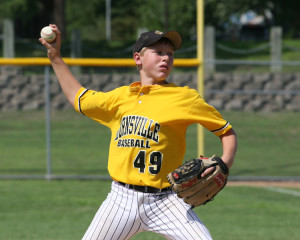Why You Shouldn’t Be Playing Baseball Year-Round

David Justice
AYC Health & Fitness
Certified Personal Trainer
– Bruce Svare, PhD. Director of the National Institute for Sports Reform
Kids Shouldn’t Be Playing Baseball Year-Round
Youth baseball is getting more and more competitive every year. With that comes more games, and subsequently longer seasons. This is NOT a good thing for children whose bodies are still growing and maturing as they attempt to keep up with baseball seasons that last from early Spring into late Fall.
There are several problems with kids playing baseball year-round, including an increased likelihood of injury, potentially not being viewed as favorably as peers by college coaches – along with the fact that it simply doesn’t guarantee any future success. Let’s get into the details…
1. You’re more likely to get injured if you play baseball year-round.
 The overhead motion of throwing a baseball is an unnatural position for the human shoulder to be placed in. It also happens to be the fastest and most violent movement in all of sports. What do you get when you combine those two factors? Overuse injuries.
The overhead motion of throwing a baseball is an unnatural position for the human shoulder to be placed in. It also happens to be the fastest and most violent movement in all of sports. What do you get when you combine those two factors? Overuse injuries.
Every time you repeat that motion and throw a baseball, it’s gradually wearing down the same muscles, ligaments, and tendons over and over again. That’s a problem all baseball players have to deal with regardless of age. For a youth athlete, the risk of injury is exponentially greater due to the fact that their bodies are still developing and maturing. This is why pitch counts and inning limits are so crucial to the health and wellbeing of up-and-coming baseball players because while they may not complain about sore shoulders or elbows in the days after they pitch, these injuries often won’t reveal themselves until years later when the individual is playing in high school, college, or beyond.
Tip: Be careful about participating in offseason showcases. These often take place during the winter months when your arm (and the rest of your body) has been de-conditioned from baseball. Going from not throwing a baseball for several months to trying to light up a radar gun on your first day back in action is a recipe for disaster.
2. College coaches (and pro scouts) prefer multi-sport athletes.
Remember Bubba Starling? The Kansas City Royals drafted him 5th overall in the 2011 draft and gave him a then-record $7.5 million signing bonus mainly because he was considered to be the most athletic player in that year’s draft class. In addition to baseball, he was a highly-recruited quarterback who had signed to play baseball and football at Nebraska. On top of that, he was an all-state basketball player as well.
While Starling’s story is a bit of an extreme, it illustrates how much coaches at the college and pro level value overall athletic ability when they’re evaluating prospects. Even though baseball is a complex game that can present any number of challenging physical situations, it simply can’t help you master the skill sets and movement patterns required to play other sports such as basketball, football, soccer, and so on.
When it comes down to choosing between two prospects with similar skill sets where one has played baseball exclusively his entire life versus another who has played two or three sports throughout high school, the vast majority of coaches and scouts will side with the multi-sport athlete. Not only is there less wear-and-tear on the prospect’s throwing arm, but in all likelihood, they are the more athletic of the two, given the variety of challenges they have faced in their athletic endeavors outside of baseball.
3. Playing baseball year-round doesn’t guarantee future success.
The best baseball player I faced heading into the summer before my senior year of college is a guy who’s now a close friend after we ended up attending the same high school and playing together for three seasons. Back in middle school, he was the total package – he could hit home runs like nobody’s business while throwing so hard off the mound that he rarely bothered with off-speed pitches because opposing batters rarely caught up to him. If you would have asked me back then if I thought he was going to make it to the big leagues, I would have given you an emphatic yes.
Sadly, it didn’t work out that way. Not even close. You see, he played on a traveling team from the time he was very young, and experienced the same thing so many in his position have gone through – he got burned out by the time he got to high school. Baseball was his life for so many years that he eventually got tired of it and it just wasn’t as fun as it used to be. On top of that, he ended up blowing his elbow out during our sophomore year after the varsity coach at his first high school mismanaged his usage as a pitcher the year before. That effectively ended his career as a flame-throwing righty.
Moral of the story? Taking several months off each year from baseball is a good thing. Just because you have shown some promise on the field and enjoy playing the game doesn’t mean you need to be playing year-round, and in fact it’s likely counterproductive as your rate of injury increases, your overall development as an athlete decreases, and it doesn’t guarantee any type of future success down the line.
If you have questions about exercise, sports performance training or anything health-related, be sure to contact me or click to book a consultation.
David Justice, AYC Health & Fitness Personal Trainer
913-642-4437 #113